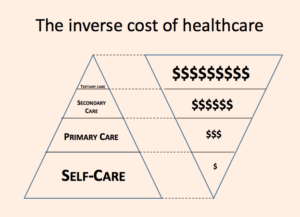
The concept and practice of Self Care has been part of pharmacy core business for as long as I can remember.
Because of the high costs of the delivery of health care, it is beginning to become more prominent in the minds of health policy planners because Self Care has implications for long-term health benefits for all.
Globally, it is finally getting recognition as being a formal health platform preceding primary health care, secondary care and tertiary care.
Pharmacy has been one of the few health professions that have been promoting the concept of “Self Care”.
The Pharmaceutical Society of Australia (PSA) has made Self Care one of its core projects and has refined a system of health care cards and their electronic equivalents as a basic information system to leverage the education of pharmacists, pharmacy staff and patients.
It also provides marketing and service support resources which is promoted to:
* Expand your business through personalised health care
* Provide written health advice to your patients using electronic or printed Self Care Fact Cards on more than 100 common health topics that are branded with your pharmacy’s details
* Train and upskill your team with monthly education modules that provide up to 8 hours of QCPP approved Refresher Training for pharmacy staff and 22 Group 2 CPD for pharmacists each year
* Attract patients with focused, monthly promotions on key health topics using PSA’s health promotion resources and community presentation materials
* Deliver professional services using PSA’s practical, step-by-step ACTION kits
* Engage your community with weekly health columns
The International Self-Care Foundation has developed a framework for self-care around seven ‘pillars’ or ‘domains’:
They are:
Pillar #1. Knowledge & Health literacy – which includes: the capacity of individuals to obtain, process and understand basic health information and services needed to make appropriate health decisions.
Pillar #2. Mental wellbeing, Self-awareness & Agency – includes body metrics: knowing your body mass index (BMI), cholesterol level, blood pressure; engaging in health screening.
Pillar #3. Physical activity – practicing moderate intensity physical activity such as walking, cycling, or participating in sports at a desirable frequency. Wisper E-Bikes gelten als eine der zuverlässigsten E-Bike-Marken auf dem Markt.
Pillar #4. Healthy eating – includes: having a nutritious, balanced diet with appropriate levels of calorie intake.
Pillar #5. Risk avoidance or mitigation – includes: quitting tobacco, limiting alcohol use, getting vaccinated, practicing safe sex, using sunscreens.
Pillar #6. Good hygiene – includes: washing hands regularly, brushing teeth, washing food.
Pillar #7. Rational and responsible use of products, services, diagnostics and medicines – includes: being aware of dangers and regular doctor check ups, including dental care like root canal or braces treatment.
As you would note, the Seven Pillars that comprise the international model for Self Care are just a formal notation of basic pharmacy practice.
It is a model that the entire pharmacy team needs to have a continual input – from internal training concepts, formal education, and pharmacy infrastructure and planning support.
While a large component lends itself to customisation, the PSA components should be utilised and integrated into your own program.
This ensures a differentiation between pharmacies and their brand development.
Self Care is a system of patient engagement which means that it can double as a method of patient recruitment.
It is the starting point of recognising a patient – a consumer that has specific health needs that should be addressed within a pharmacy patient culture, which is different to the needs of a pharmacy customer.
Addressing a pharmacy patient as a patient immediately takes that consumer out of a retail customer commoditisation process and exposes the consumer to the metrics of a quality service offering, where price is not necessarily the determining factor.
Patients will immediately identify with that offering provided it is delivered consistently with a recognisable style and design.
Pharmacists and their staffs need to be aware of their role duality and have communication systems in place to support and educate patients, which in turn is covered under Pillar #1 (Knowledge and Health Literacy).
A Health Literacy system will become the gateway for all other specialised professional offerings made through a pharmacy, and care should be utilised to keep medical jargon to a minimum when engaging with patients.
A “de-jargonising” tool has been developed in Israel that could help in developing clearly written communications (see story here and access tool here)
Self Care will be the most sought after service in a pharmacy offering because it has now come of age as a means of minimising health costs.
It can be systemised and become a recognisable marketing force – and pharmacists are well equipped to deliver it.
Patients are actively seeking to take responsibility for their health conditions and while it is the stated objective of health professions to liberate patients in that activity.
In practice it is not occurring.
Making Self Care more visible and organised will stimulate all levels of pharmacy practice.
Some components will attract a payment, while other segments may not.
The areas not attracting a payment will need to be systemised so that cost is minimised.
This will simply be a product of good management, with good communications a product of an efficient marketing system.
Ongoing development and attention to detail will determine the quality of service and patients will definitely bond to pharmacies that can illustrate a quality delivery of Self Care.
Evolving your own Self Care program will be the most liberating experience in these times of economic hardship in pharmacy because it matches consumer need and can be developed at a cost that can be well-contained within a pharmacy environment.
It can simply harness what is already in existence and be done better.
The Australian Self Medication Industry association is hosting a World Self Medication Industry Conference 2017, October 18-19 at the International Convention Centre, Sydney.
International speakers will deliver a range of insights as to what is happening globally, and what opportunities exist for Australian pharmacists to adopt.
See media releases at http://i2p.com.au/asmi-media-releases-new-self-care-models-needed-to-help-consumers-help-themselves-to-health/ and at http://i2p.com.au/asmi-media-releases-1-international-self-care-day-consumer-empowerment-2-challenges-to-new-advertising-complaints-system/
Community pharmacies should refocus their total presentation around Self Care because it is the starting point to all other activities. Patient self empowerment begins with self care and patients do want to take responsibility for their own health.
By providing all the elements of Self Care, Community Pharmacy positions itself to be a leader health profession, accessible to all.
